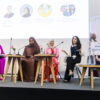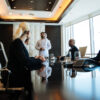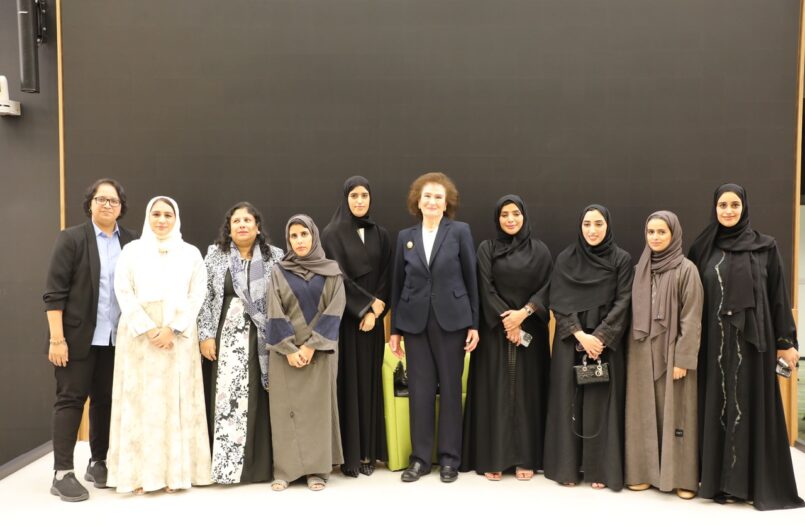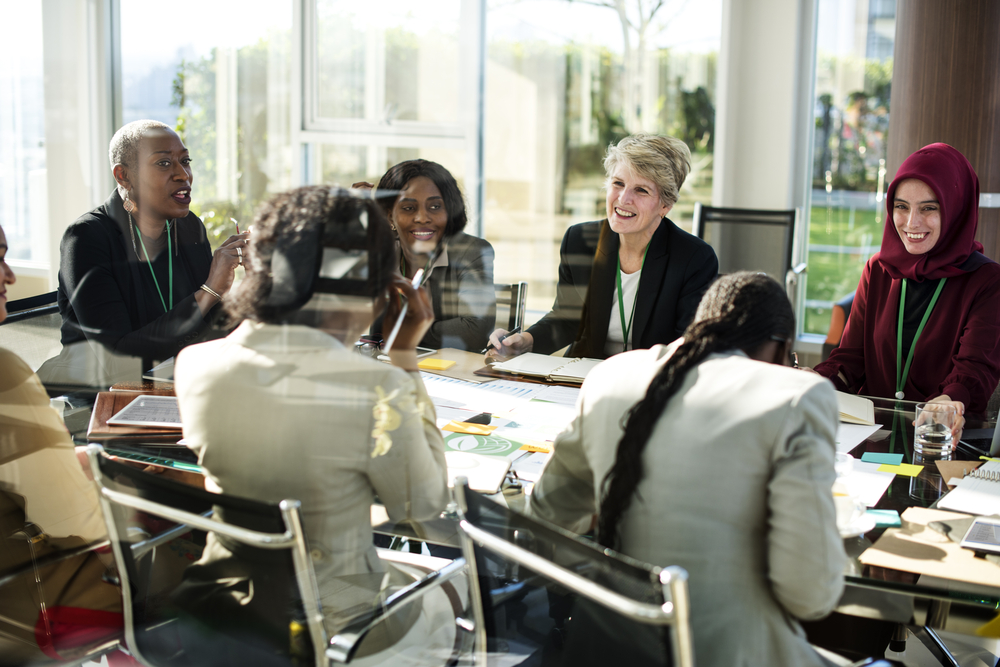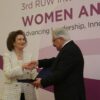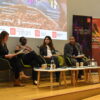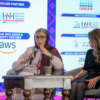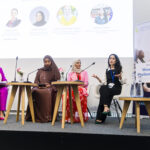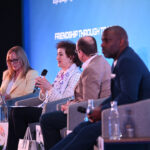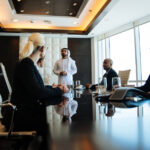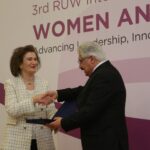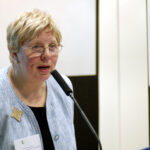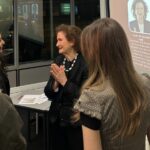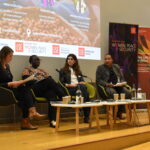At a special Keynote and Q&A event at the Abu Dhabi School of Management in February 2025, AIWF President & Founder Haifa Al Kaylani OBE shared her insights with ADSM’s cohort of young future business leaders on the growing role of Emirati women leaders in sustainable development in the UAE, across the region and globally. She also highlighted how women, youth, technology and entrepreneurship – are game changers for sustainable development as we inch ever closer to the 2030 SDGs watershed. Climate, sustainability, food and water security are the foremost challenges for the whole of the MENA region where economic growth and security are intrinsically linked with human security, prosperity, and social cohesion. The Arab world needs a thriving economy to meet the challenges of youth unemployment, food insecurity, water scarcity, women’s under-representation in the economy, and to alleviate hunger and poverty challenges.
She was delighted to speak at the very kind invitation of Dr Deepanjana Varshney, Distinguished Faculty of the Abu Dhabi School of Management. They were joined by Dr Valerie Lindsay, Academic Dean of ADSM and the valued Emirati women leaders from the ADSM programme. She was pleased to share her insights on the growing role of Emirati women leaders in sustainable development in the UAE, across the region and globally and to highlight how women-led innovation – how women, youth, technology and entrepreneurship – are gamechangers for sustainable development as we inch ever closer to the 2030 SDGs watershed.
Haifa also shared UAE policies on sustainability and the role of UAE women in sustainable development and talked about a leading example of a UAE organistion that is supporting Emirati and global women in sustainability – WiSER, the ‘Women in Sustainability, Environment and Renewable Energy’ initiative launched by Masdar in 2015 led by Dr Lamya Fawwaz, AIWF Board Member & Executive Director of Brand & Strategic Initiatives at Masdar. She also shared the AIWF partnership and joint initiatives with WiSER and presence at COP28 and more recently, at Abu Dhabi Sustainability Week 2025. Haifa also discussed the exemplary commitment of the UAE leadership to sustainability and social wellbeing of the Emirati people which is nothing short of inspirational, and it has resulted in a generation of Emirati women who are leading the way forward and using their education, talent, and skills to further climate governance and sustainable development.
Haifa has had the privilege over the years of speaking at many of the world’s leading institutions of research, knowledge and innovation, including Harvard, Princeton, INSEAD, The Wharton School of Business, Cambridge and the University of Oxford, and in the Arab world – Zayed University amongst many others. She was truly honoured to be invited by ADSM and to meet so many of the wonderful students. Our young women leaders are all the future of this great nation and of the region, blazing new trails and creating critical new pathways and opportunities for the next generation. In that, all of us at AIWF stand with you every step of the way.
The Board of AIWF looks forward to further collaboration in the future with Abu Dhabi School of Management to support, empower and recognise the talent, skills and innovation of women entrepreneurs in the UAE and the MENA region more broadly.
Key Insights Shared
Haifa founded the Arab International Women’s Forum as a non-profit, non-governmental organisation in 2001 with the clear aim of supporting women’s leadership in social and economic growth in the MENA region and internationally. Our work and programmes are greatly focused on education, decent employment, an entrepreneurial ecosystem and an economy that is open for business and open to all. AIWF sees women as engines of economic growth contributing to prosperity and stability, and as key to the well-being of all communities.
On the challenges of food security in the MENA, Haifa shared that according to the World Health Organization, in 2023 around 2.33 billion people globally faced moderate or severe food insecurity. In December 2024 a UN report highlighted that hunger in the Arab region worsened amid deepening crises in 2023 and that the Arab region remains off track to meet the food security and nutrition targets of the SDGs by 2030. Conflict is the main cause of food insecurity and malnutrition globally and in the Arab region. Economic challenges, high-income inequalities, and climate extremes also play significant roles. Rising food prices have worsened the crisis.
Empowering women and young people to innovate and address food security and water scarcity challenges in the MENA is crucial in this regard. Although women, especially in rural areas, play a pivotal role in water and food security, they often face barriers in accessing resources, participating in decision-making processes, and benefit-sharing, which limits their potential to contribute solutions to these challenges. For AIWF, the empowerment of women and girls goes hand in hand with sustainable development and is essential to the achievement of Goal 5, because gender equality underpins all efforts to realise a sustainable future society that cares for people and planet.
Arab women have established themselves as green business leaders and entrepreneurs. From start-ups focusing on renewable energy to businesses emphasising sustainable agriculture, women are leveraging and strengthening the region’s economic fabric, embedding sustainable practices within their ventures, and ensuring economic development aligns with environmental preservation and social responsibility. In the tech / AI space, Arab women are at the forefront of the region’s digital transformation. From e-commerce platforms that promote sustainable goods to apps that track carbon footprints, tech-savvy Arab women are creating the tools capable of mainstreaming environmental consciousness and climate action in the MENA, particularly in agritech.
Haifa shared UAE policies on sustainability and the role of UAE women in sustainable development, and how the UAE is leading the region and is indeed respected all over the world for its efforts to mainstream and empower women in all sectors and spheres, including and especially in sustainable development. This is all thanks to the inspiration and support of Her Highness Sheikha Fatima Bint Mubarak, The Mother of The Nation. The commitment of the UAE leadership to the sustainability and social wellbeing of the Emirati people is nothing short of inspirational, and it has resulted in a generation of Emirati women who are leading the way forward and using their education, talent, and skills to further climate governance and sustainable development. Many of the opportunities for Emirati women to lead in climate governance are a result of the UAE’s progressive policies on climate and sustainability.
Projects like Masdar City in Abu Dhabi and Sharjah Sustainable City exemplify the UAE’s commitment to sustainable urban planning. These developments focus on renewable energy, energy efficiency, and sustainable living practices – with women and young people at the heart of these entities. In 2019, the UAE achieved gender parity in the Federal National Council, with women holding 50% of the seats, reflecting the nation’s commitment to women’s participation in governance. The UAE Cabinet has included several female ministers overseeing portfolios such as advanced technology, food and water security, and community development. We were all delighted to see recently the appointment of HE Dr Amna bint Abdullah Al Dahak, Minister of Climate Change and Environment, UAE, to oversee and lead environmental initiatives in partnership with other government partners, the private sector, startups in relevant sectors, and all segments of the community, in an effort to achieve the UAE United Arab Emirates’ ambitious Net Zero 2050 Strategy.
In 2015, Masdar launched WiSER, the ‘Women in Sustainability, Environment and Renewable Energy’ strategic global initiative, as a global platform that champions women as leaders of sustainable change. WiSER is an institutional partner of AIWF and a leading example of a UAE organisation that is supporting Emirati and global women in sustainability, For several consecutive years now, AIWF has been very visible and represented at the WiSER Annual Forum and at Abu Dhabi Sustainability Week (ADSW), where I regularly participate as a panelist and roundtable speaker. We have been most proud to work closely with WiSER on a series of conferences and programmes on empowering women’s leadership in climate action and sustainable development. Both organisations believe that women must be empowered and fully engaged at all levels of policy, practice, and decision-making processes because they are key agents of change who hold the power to transform and innovate solutions to the world’s most critical sustainability challenges. This was one of the key recommendations that emerged from the report of AIWF’s May 2023 joint conference at the Royal Academy of Engineering in London with our partners at WiSER, held in the leadup to COP28, where together we delivered close to 40 viable, action-oriented recommendations for the global community of women in climate, sustainability and STEM. AIWF is now planning a further conference with WiSER later this year in June 2024, on the sidelines of London Climate Action Week, to follow up on these recommendations in light of the many exciting developments at COP28.

